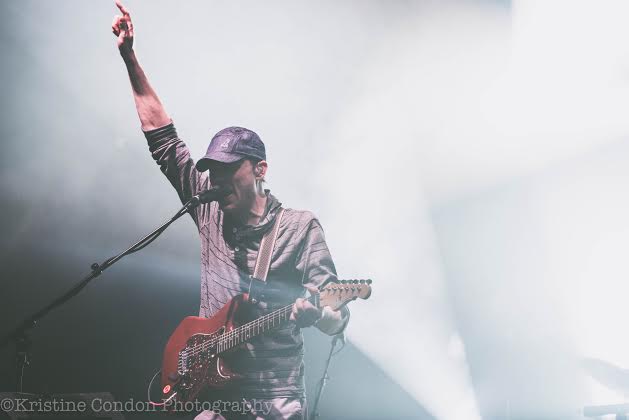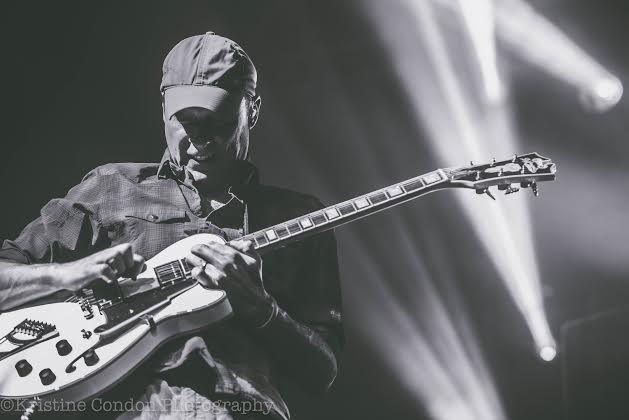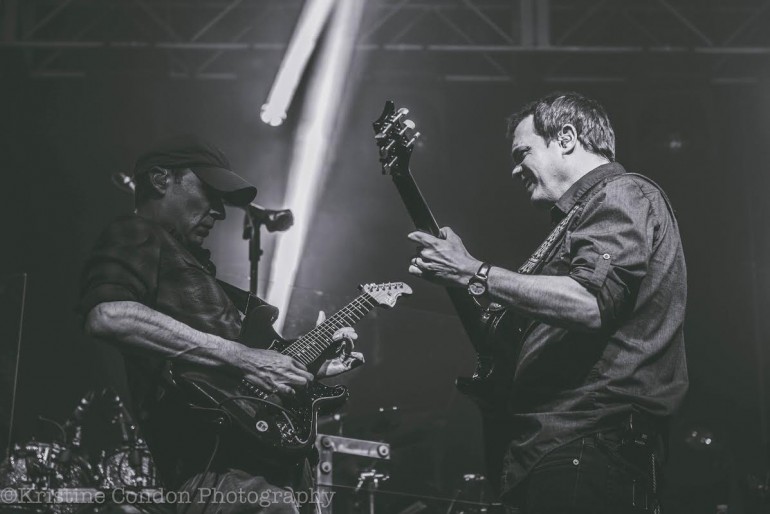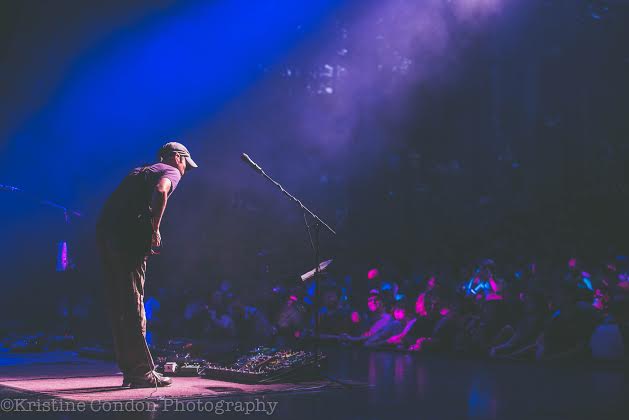Words: Ryan Mannix | Photos: Kristine Condon

Cinninger’s guitar technique is precise, yet expansive. Stylistically and technically, he has no boundaries. Combine a mastery of jazz harmony with a love of 80s-style metal shredding and he can really open things up. He’s capable of anthemic, melodic licks, and repetitive odd-time feels.
Jake’s one of the most creative, and unique guitarists playing today. It was a sincere pleasure to learn more about what makes the sound come alive and what makes the person tick.
I see you usually play a G&L Strat clone but will sometimes switch it up with a Becker. What’s the difference in tone, and how do you decide which one you’ll use?
Depending on what venue, or if I’m using a noise canceling pickup, or a single coil, or a humbucker, for a crunchier sound. Sometimes it’s on a song by song basis. I have a drop D guitar ready for songs that I need that on. Generally, I like to have a guitar I can use the whole night. Mostly, that’s about noise and how the power is conditioned on stage.
Does the G & L have the noise canceling pickups?
Yeah, it’s a Comanche, which is a Z coil. It’s essentially a Fender P-Bass pickup that has the two poles pointing north and south that creates the noise canceling effect on the single coil. You get that nice single coil snap without all the hum.
I notice that the Becker has a lot bite to it, what pickups are on that?
Those are custom made pickups that Dan Becker had commissioned for that guitar, so it’s kind of a PAF sounding bridge and then a Lily Fralin single coil in the neck. Then a split coil on the humbucker, so a lot of options. It’s got a lot of girth and good top end.
What’s your amp configuration like now?
My teal green amp is an Oldfield custom. That’s basically the hot rod; my Marshall Rectifier sound. Paul Gustler, who runs Oldfield, we kind of voiced the head after that. I told him I wanted it to sound like a Brontosaurus with teeth kinda thing. Big, bossy with a sharp attack.
We went through tube configurations to get the most power, and I’m running those classical electro-voice twelves that can handle a ton of gain and low end, and not really break up. The idea was to not let the speaker break up and leave it to the amp, almost like a bass driver.
The other side is my cleaner side, Fuchs costume ODS, also running a Schroeder custom head, which I just got, It’s really nice. It shapes the guitar really nicely. It’s really like a hi-fi amp, it’s got a lot of gold cable grating inside, really amazing construction.
They’re out of Chicago, right? I saw Nels Cline from Wilco playing one.
Yeah, Tim Schroeder. Tweedy uses one too, I think, and the bass player. Keeping it local.
Any new pedals you’ve got recently, or ones you’ve been into?
A lot of the new Source Audio gadgets they’ve been coming out with. They seem to really be on top of it.They keep getting smaller and more powerful, which is kind of the idea. Moog Phaser, I’m really digging, I love those analog phasers, just cream of the crop stuff.
What else? I’m playing an old Maestro Phaser, like that Jimmy Page sound. It’s a huge box, totally bulky, but it’s got a spinning mechanism inside, so it’s completely analog. Like a little Leslie. You get that instant Jimmy Page. You could play "Stairway to Heaven" all day.

Who are some of your bigger influences?
My parents had a kick ass record collection, and one the first guys that really caught my ear was Jaco Pastorious from Weather Report. I was just freaked out by his aggressive sound. He sounds like Charlie Parker on the bass. Then I moved into Al DiMieola, his precise picking pattern, very percussive. He’s great.
I really liked the Tele masters like Danny Gatton and Roy Buchannon. Albert Lee. Those cats had the sound in their hands. Rory Gallagher, Irish blues dude. I’m always going backwards and trying to find those forgotten about greats.
How did Miles Davis influence you?
I think if anyone has a main instrument, they are always trying to get out of the box. Try to think like a horn player the way they stack intervals instead of just playing consecutive notes. Trying to figure out arpeggiation the way they would skip around. More vertically.
There’s a bebop metal thing. There’s almost like breaths, and commas, and periods between the notes. Miles would create a new downbeat, in a way different place than the drummer, but it would be really satisfying.
How do you guys write a setlist?
All day we’ll be working on a setlist and it will be out where everybody can see it so we can add and subtract and start throwing in some arrows for segues for movement. And we can talk about tempos or key changes in between songs so we’re all on the same page.We’ll obviously stay away from songs we played the last time we were in that particular town. Making it different.
Then we’ll set up practice gear and put the setlist in front of us and work through transitions, and brush up on any difficult sections. We like to mix things up for people. If we’re playing the same town its mostly the same fans going. Sometimes on like an East coast run we might divide the song list if we know a lot of people will be hitting up multiple nights. Like what heavy hitters do we want Friday night or Saturday.
Do you ever feel with the talkbacks or hand signals it could be restricting the improv in a way or forcing it?
With the amount we do this, there will always be gray areas. When we get that feeling, the more we tend to stay away from it. We want it to sound written or intentional in that improvisational world. Sometimes someone will make a changes and the other guys will be like “oh man we were just getting into it”.There’s gotta be one shepherd and the rest sheep when we’re throwing up key changes or something.
In a way it was kind of what Frank Zappa was doing with his band -- anyone can step into the role of band leader and create movement. Sometimes you just gotta throw in the towel and move on if it’s not working, but that was happening more 6 or 7 years ago. Now it's like... just change course. A lot of times we’ll do like a thumb up and that’s when everybody stops and I’ll start something new, kind of a clean slate. You can come up with a new progression and go from there.
I notice you guys will do hits and cutting out, is that something Kris says into the mic?
Yeah, he's the easiest guy to control those things. Then Jefferson, our lighting guy, can hear everything we’re saying and can respond with the lights. It’s a great effect.
Sometimes it’s hard to tell what’s improv and what’s written...
These changes and ideas are happening inside the creativity. It’s basically like someone throws up a cue and you have a measure to react. Very quick "simon says"-type reactions.
Do you have group improv exercises?
If anything it would be to break up rhythmic monotony. How can we break those patterns and maybe stay away from the downbeat? More sophisticated, like Kris might say to throw in a dotted 16th rest to make it a bit more special. The first idea is never good enough, sometimes its the second or third. It’s almost like what you take out of the idea is the best -- it has more periods and commas. Sometimes we’ll bring a chord progression or riff to the practice room before the show and then clean it up and jam on it that night.
How do you guys decide to play something like that?
It’s very much democratic. If someone feels really strongly about something, like they’ve been working it out back stage, we’ll take the time to learn it.
How has your approach changed since you joined the band?
I think when I joined they were really looking to change the sound, like moving away from a more typical jam band sound, and exploring jazz and metal and classical composition more. We all were trying to prove something; we were playing our asses off every chance we could, I think we learned some restraint over the years and become more musical. It’s not about proving ourselves anymore. Now we know what works and doesn't work.

How do you and Brendan not step on each others toes with two guitarists?
I think over the years we set up specific goals. Like Brendan is more into soundscapes and use of effects, and I'll tend to keep it more clean. Kind of playing that horn role. Brendan will set up the bed, sometimes that changes but we usually end up where we’re most comfortable. A lot of times I’m searching for a melody and he’ll be going for a chordal pattern. It’s not like a solo, I’m kind of trying to write as we go along.
How do you guys improvise guitar harmony?
It’s very modal and box oriented. Mostly using your ear and just how quickly you can adjust to the problem, literally inside a measure. Like if we're on top of each other I’ll skip up to the 5th or the 3rd. It’s really taking that Allman Brothers approach and making it a little more progressive, with a bit of metal. It’s kind of the same ethos.
You guys do a duo acoustic show over the holidays, is that ever something you’d do more of, or maybe one day, release?
Yeah, we have like a 12 year history of that particular show. I think Kevin Browning is going to put out a compilation package of the best of performances from over the years. That’ll be coming down the pipeline. We’ve thought about doing other shows, and that may come in the future, but it’s such a special little show right now. It’s cool to just do one. It’s a lot more intimate and the warts are all there.
How have your and Brendan's styles affected each other?
I think we tried to create an obvious difference in the voice, where Brendan is more legato, and a warmer fuzzier sound. I’ll go with a snare drum line. I’m more Strat and he’s more Les Paul. We’ll inspire each other a lot throughout the night which is a lot about having an ego-less mentality when you have two of the same instrument.
Were you influenced by The Grateful Dead at all?
Big time. I’m a huge Jerry fan. The way that he phrases, it’s very drippy, like it’s sliding off the table. Again where his downbeat is is a different place than the band, it's kind of trickling off.
It's a very mature feel. It takes years to play slow 16th notes like that, and make them feel bluegrass even though its in a rock form. It’s slightly swing. I’m a huge Dead fan, I’ve been rocking those guys ever since I could think.
You guys have your own completely different sound, but some of the musical philosophy seems similar
Yeah, that was like the only way we could make a thumb print. we were taking our influences, the stuff we listened to in high school like Nine Inch Nails, Metallica, Tortoise, cool underground indie shit, and we took these sounds that we had. Like Phish used what they listened to in high school, you can hear it in their DNA. It’s really what you're deeply influenced by that will show in your playing.
Who’s your favorite sit in guest?
That’s a good one. I mean, Joshua Redman, one of the best sax men -- he’s got the biggest ears ever. We’re such a loud bossy band, and he fits in really well. I have to change my paying when he shows up. He really goes inside the songs and learns the licks. He has a photographic sense of the arrangements. Really nice guy, too.
Who would you want to have guest?
I’d love to do something stripped down with a guy like Bill Frisell, his piano-like playing where notes cascade over one another. It would be cool to do like a special performance.
Who would you want to sit in with if you could?
It would be fun be one of the Thin Lizzy guitarists for a couple nights. They were like one of the first dual guitar rock bands. Steve Morse has an awesome job playing with Deep Purple which is kind of Holy Grail stuff. I’d like to be the second guitarist in The Police.
I hear a lot of them in your sound...
Yeah, if you think about those guys, they took a great idea and made it more minimal to make it sound larger. A testament to what they didn't play.
You guys have played a bunch of their tunes. I saw you play "Driven To Tears" at Summercamp a few years back.
We should just be a Police cover band. Yeah, I love that solo because it’s like all the wrong notes.
How’d you write “Nothing Too Fancy”?
That was written in 1998 with the drummer for my old band, Ali Baba’s Tahini. The idea was to write something with serious tempo and really play it. It’s kind of like a bluegrass thing if you were to play it with that feel. It was kind of our barnburner.
Could you talk about soloing over “White Man’s Moccasins”? It’s got like a free dissonant feel over some cool jazz inspired chordal movement.
The idea is to kind of go against the grain. Kind of taking the Andy Summers approach and playing the wrong notes and they become right. It’s one of those ones I can really stretch out. The goal is kind of to freak myself out, I guess. A lot of the time I’m looking at the key of E minor but I’m completely trying to stay away from it. Anything goes if you play with intention.
At the end of “Bridgeless” you guys have an oddly syncopated guitar line. What’s the idea with that section?
That’s a technique called “hemiola”. The guitarists are kind of playing against time, and then it kind of goes around and after 4 or 5 bars it lands on the 1. We’re kind of playing in a different time signature then the rest of the band.
What’s your favorite cover and original to play?
I really like playing “Shine On You Crazy Diamond” because I think we do it really well. It’s a very touch sensitive song to do it right. Of the originals, I like “Plunger” because it has all the ingredients that make up a good Umphrey’s song.
Which songs lend themselves best to improvisation?
Really any song, because when we get to the improv section we don’t know what’s going to happen. One’s that have worked in the past are “Utopian Fir”, even songs like “FF” which you wouldn’t think would lead to crazy improv, but they always seem to for some reason.
What’s the process for creating mashups?
We generally start thinking of things that work together, and we just gotta get into the rehearsal room and try things out. We kind of map it out where everything is in boxes and arrows getting from section to section. It’s like a long math problem in a way. Generally, they tend to work if they’re the same tempo or in the same key.
You recently put out the “Reel To Real” movie, how’d that come about?
We were trying to think of something different to do for the fans, kind of like a Storytellers thing, and then turn it into an actual performance. We didn’t really know what’s going to happen once the questions started firing. It’s not really something I’d like to do a lot of, but that novelty thing is kind of what the fans like.
Was it weird going back through the old footage?
Yeah, it was. Most of the stuff I haven't seen since it was recorded. It’s like "Oh My God", now I remember that point in time. It’s like you forget about it until you see it.
You also do some producing, does that get you something musically that you can’t get playing?
Definitely. I’ve had a beautiful studio in Niles, Michigan for about twenty years. Occasionally when I have the chance to have other bands come in, I do. I love the studio side just as much as playing live. Knob tweaking and getting the drum sound just right is some of my favorite things to do.
What’s the strangest thing you’ve ever seen in the audience of an Umphrey’s show?
Oh, let me think... A butt naked girl, tripping trying to climb over the rafters and work her way towards the stage with a really menacing look in her eyes. We almost stopped playing, I think.
What cover would you want to play but the band can’t get behind?
Something like "La Villa Straviahgo". All the Rush fans that are into Umphrey’s are like, “you have to do this one”.
What’s next for Umphrey’s and you specifically?
We’ll be in the studio a bit this year, trying to work on the next release. That’s going to be really exciting. I think it’s what everyone’s been looking for, but I can’t really comment at the moment. As far as me, trying to spend as much time with my three kids and wife as possible, and watch them grow. Then try and write as much music as possible in the down time of being a family man.
What's your advice for young guitarists?
Really the way I’ve gotten to this point is by will power. Where there’s a will there’s a way, and if you put that into a note, you can make something special.

Check out our recent interview with Brendan Bayliss HERE.